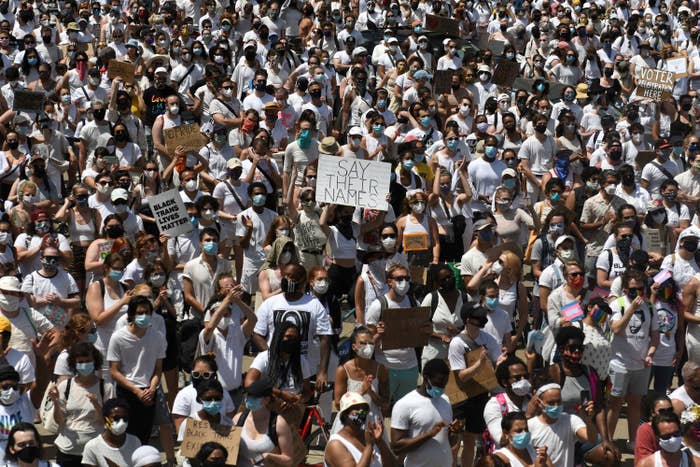
Black trans sex workers’ rights activists say they are fighting for their lives.
In the midst of a generational reckoning over systemic racism that has coincided with a pandemic and Pride Month, the killings of two Black trans women — Dominique “Rem’mie” Fells and Riah Milton — within just 24 hours and the brutal beating of another have fueled protests and demands for action on the specific ways that racism and police violence affect the LGBTQ community.
Black trans people are more likely than their white counterparts to face employment discrimination and housing insecurity, and criminalization for their gender presentation under statues that permit police to profile people they think may be engaging in sex work. A staggering number of Black trans people — nearly half, according to a 2011 study from the National Center for Transgender Equality and the National Gay and Lesbian Task Force — have also been incarcerated.
Those who sell sex face even greater criminalization and the possibility of violence at both the hands of the police and their clients.
With historic protests for Black Trans Lives in Brooklyn and around the country on Sunday and a 6–3 decision from the Supreme Court making employment discrimination against queer and trans people illegal, there is growing momentum for change. But even as recently as Friday, the Trump administration attempted to undo protections for healthcare for trans people, and advocates say that policy progress — like a bill to repeal what’s called the “walking while trans ban” that has moved slowly in the New York state legislature — is still falling short.
Andrea Ritchie, who has written about the way that women and transgender or non-conforming people of color are marginalized even in conversations about racist police violence, has said, “We’re not trying to compete with [George] Floyd’s story, we’re trying to complete the story.”
BuzzFeed News spoke to four Black trans women who are current and former sex workers about what they’re fighting for right now, what they need people to understand, and what they see as the most urgent changes necessary to help their communities.
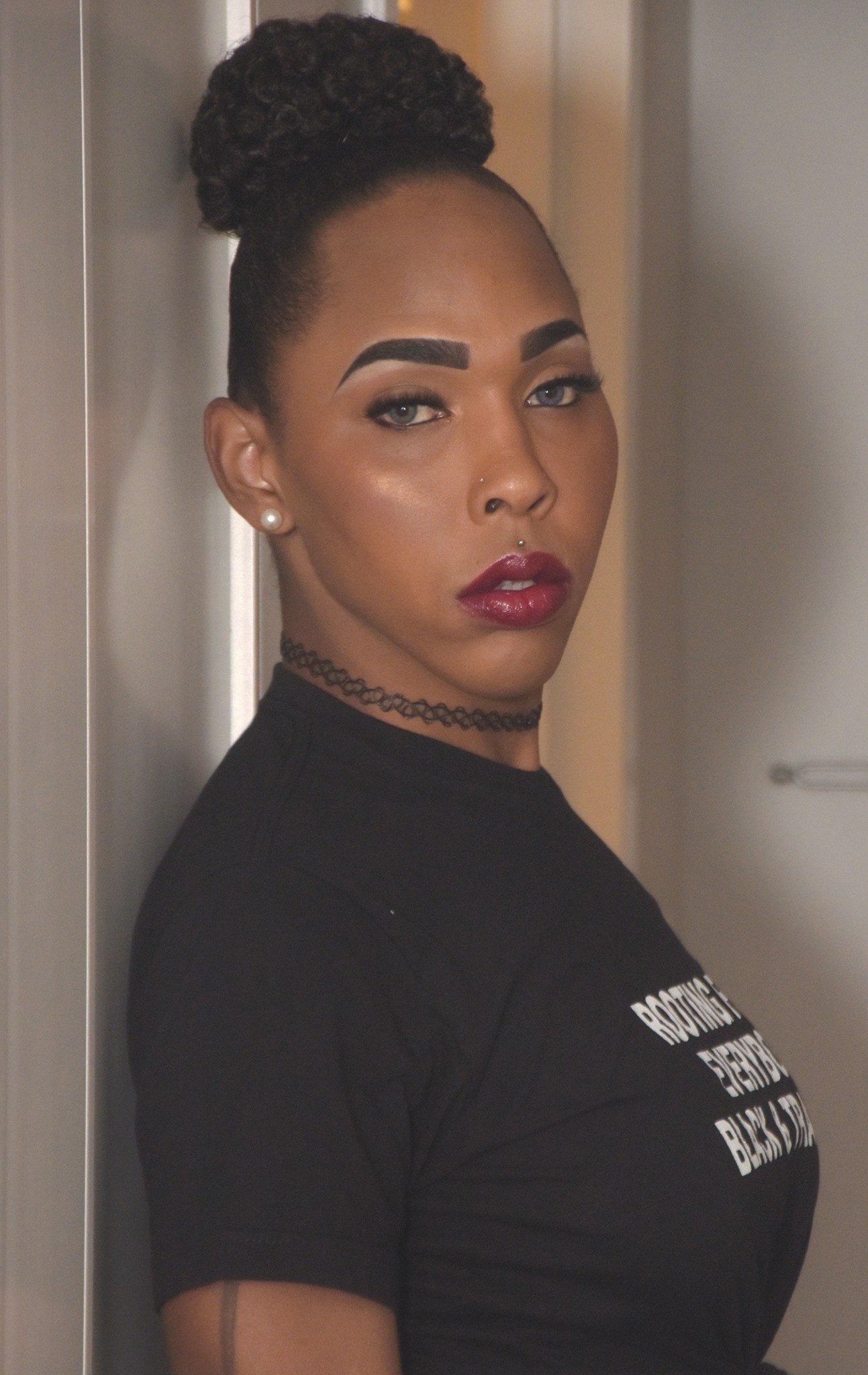
Milan Nicole Sherry, 28, is a community organizer and former sex worker living with HIV. She is a founding member of BreakOUT, an organizer of the TGNC Peoples COVID Crisis Fund of Louisiana, and is launching a new for-trans-by-trans community organization called House of Tulip.
Sherry organized the Black Trans Lives Matter rallies in New Orleans on May 30 and June 5.
My name is Milan Nicole Sherry, and I would like for you to write it just as that. Milan Nicole Sherry. I think it’s very important that it’s my name, and for people to know it. Oftentimes when you hear the names of Black trans women it’s because we’re murdered. I think it’s very important people hear my name while I’m here.
Why did you become an activist?
As a trans woman, I’m fighting for my very own life, as well as my siblings. So I had no choice. I could no longer sit around and just cry and have these conversations with my girlfriends about what we don’t have. So my activism, yeah, it started in my experience and the things and trauma that came from me engaging in sex work.
But it also started as me saying I am a Black trans woman. I had no choice because I want to live. When you’ve got to constantly look over your shoulder when you leave out your door, and sometimes your own home isn’t safe.
I want to combat the image of this sensationalism and glorification of activism.
As a Black trans woman, I am personally tired. I am no longer interested in fighting for space within LGBTQ agencies, organizations. I am no longer interested in fighting for space in these cis-hetero spaces. I am now focused into building our own, for-us-by-us. I’m tired as a trans woman, giving my power to these cis individuals, these agencies that ultimately don’t care about us. They don’t value us for real. The only thing we good for is when they hire us into positions and now all of a sudden “we’re inclusive.” It’s only because at the end of the day we’re written into those grants that they’re getting funding for. But yet we get entry-level positions, we get outreach worker positions, we get recovery specialist positions. But we are the ones that’s doing the real work.
Have you been participating in the protests?
Yes, I’ve participated. And I’ve definitely been there to talk about police brutality. No one is above accountability. Black lives will never matter if you’re not including Black trans lives. As long as it continues to exclude Black trans and GNC [gender nonconforming] folks, there will always be a divide within the movement. This movement I describe as a chessboard. You have to strategically move your pieces so your king and your queen will be saved, most importantly the queen at all times, most importantly the queen, being Black trans women.
Many people have said the killings of trans people like Tony McDade and Nina Pop don’t get the same attention as cis men like George Floyd. Whose names do you think need to be said and remembered right now?
To be honest, there are so many. It’s one too many. It’s not about just Tony McDade, about just these current individuals who have lost their lives, whether to law enforcement or ignorant peers. This is years of girls and transgender men and women being murdered in the street.
You say Tony McDade’s name. You say Keisha Jenkins’ name. You say Muhlaysia Booker’s name. You say Penny Proud’s name. You say Chyna Gibson’s name. You say all of their names.
’Cause the sad part about just saying their names is that when those individuals were alive — it’s just unfortunate it took those individuals’ death to know how worthy they were. Because when we die, when we’re murdered, when we’re slaughtered in the street...there’s “Black trans lives matter,” there’s “say her name.” Everybody takes to the streets, and they rally, they protest. But where was that same energy when that lady was alive? We could have prevented that death. We could have prevented that situation, but we didn’t.
Is there anything that’s bringing you joy or giving you hope right now?
It’s giving me hope to see a resilience in my community that has always been there. What gives me joy and hope is I know that not every trans woman is going to fall victim to hate. Because we have a lot of talent in our community. A lot. We have trans women who are brilliant, who are intelligent, who are doctors, nurses, lawyers, who are running for office, who are in office. Andrea Jenkins, who is a city councilwoman in Minneapolis. She’s a Black trans woman and she’s a city councilwoman. We have so many of what they consider success stories, but they love to sensationalize the murders and the beatings and the violence that we go through. But they don’t show us in a different light that we are, in fact, like you.
We’re like you. We go to work every day, we put our underwear on one leg at a time, if we’re not disabled. We get dressed, we start our morning routines. And, all we want to do is provide for our families and get home safe to our loved ones just like you.
But many of us don’t make it home. Many of us don’t have a home. Many of us don’t know what home is. And for many of us home isn’t safe.
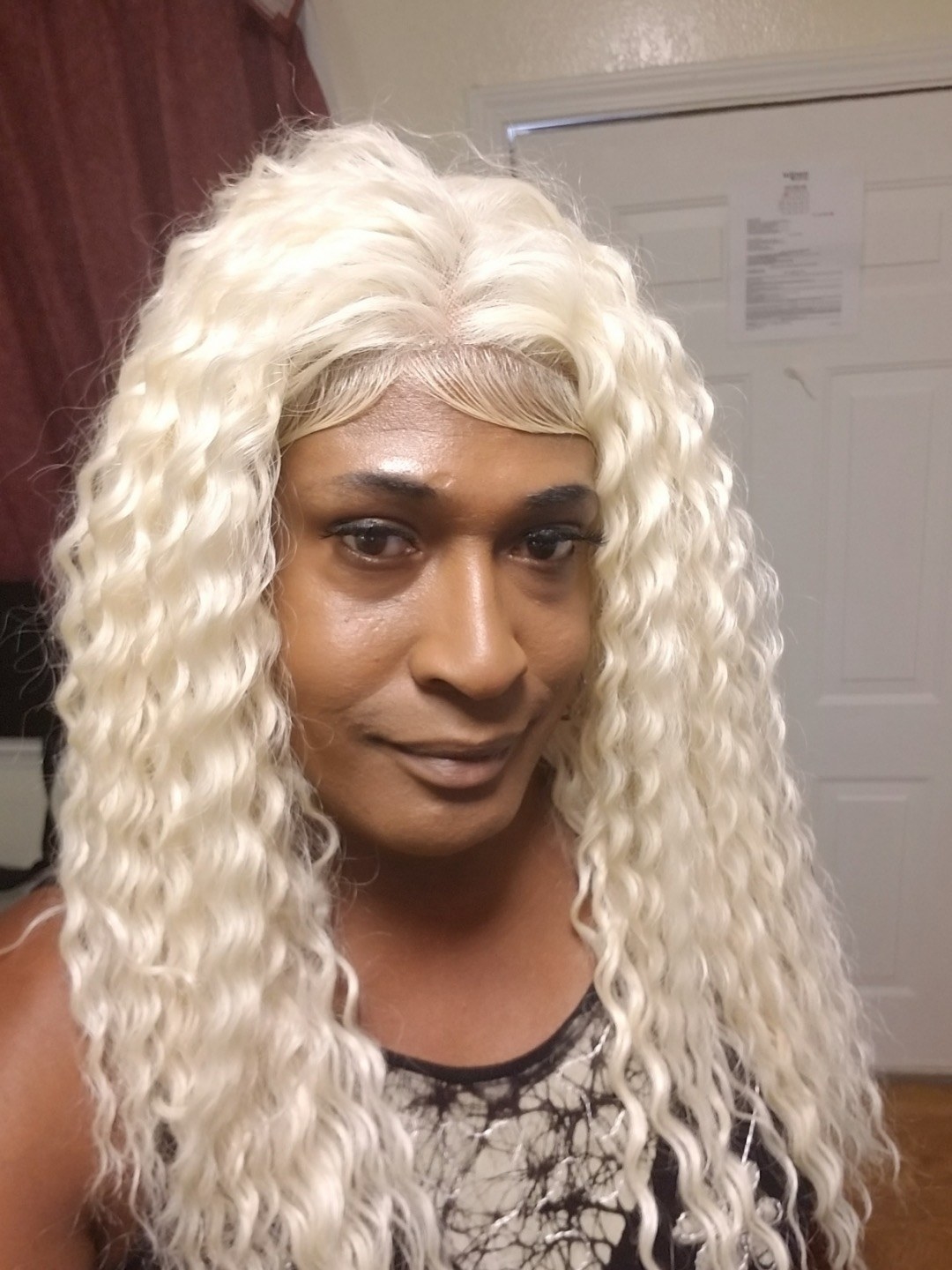
Tamika Spellman, 53, is a former sex worker and sex workers' rights advocate and policy and advocacy director at HIPS in Washington, DC. She is the lead organizer of the Sex Worker Advocacy Coalition.
What are you fighting for right now?
That’s a lot. That’s a big question. Oh my.
I’m fighting for my very life at this moment. I’m fighting for the lives of Black people. I’m fighting for the lives of transgender women. I’m fighting for the lives of femme, nonbinary, androgynous people of color. I’m fighting for Black males that are being murdered by the police. I’m fighting for those that have mental health problems. I’m fighting for the homeless.
I’m fighting for the marginalized that this country tells this is the land of milk and honey, that this land is free, when it’s not. I’m fighting to change the systemic racism that is inherently built into the very fabric of this nation. I’m fighting for the reparations because my people are owed for building this nation, for building the wealth of the few. It is time for the equality that the Constitution guarantees, that the preamble decreed.
What are the most urgent changes that you’d like to see?
The most urgent change for the world right now, I would say, is to defund all police. Number one, that is something that is urgent.
Secondly, we need sensible legislation coming out of Congress. It is time for them to start putting impact studies on the laws. All of them should automatically come with impact studies to study their effectiveness — if it is actually meeting its objective. If it is not meeting the objective then we need to undo it, change it, alter whatever ill it does. See that’s where we come to the war on drugs. This war has been going on for decades and there is no end in sight, and there is no victory. And that is one law where many people in Congress have been saying how dreadful it is. Not one of them has had the courage to go and undo it or change it for the better. Instead they keep adding dumb shit to it.
When they implemented SESTA and FOSTA [a 2018 law that caused websites to restrict sex-related content], they didn’t think about the wide-ranging implications of what it could do to people who were not trafficking victims. And now we have Ro Khanna [a US House of Representative member from California] sponsoring that bill to have an impact study on that piece of legislation. Because it’s been damaging peoples’ lives and their livelihoods, consenting adults. But you broad-brush the law and don’t think about the impact overall. They broad-brushed laws for the drug war, and did not think about its impact. It devastated the urban communities of color. It’s the evolution of what they did to Black Wall Street. They just didn’t burn it. They put laws in place to keep it from thriving, to keep people from surviving. Because all the jobs left the cities. They moved into the suburbs just like the white people did with white flight. They left the inner cities to die. They did not want us to have anything of our own.
What do you need from people who are not trans or gender nonconforming?
I need everybody, Black and brown, to understand and to support fully their people, no matter what it is, just because I’m asking. And I need my Caucasian counterparts to have some understanding for why I’m asking. These things that we’re asking for are not — it’s not like we’re asking for you to give us the world. We’re asking for our freedom. We’re asking for the ability to thrive and to grow and to live my life unencumbered from barbaric laws. There are some laws that shouldn’t even be put on the books.
I need everyone to think and be rational in their reactions and to push our legislators in the right direction for everybody. This isn’t just for me. What goes on with me is a result of what can be done to you. If they’re willing to take away my rights, what makes you think that they won’t take yours?
Have you been going to the protests?
No. Too many people without masks. Too many people in close quarters. I have a heart condition. I have to be strategic. COVID-19 is still out there, and they don’t have a treatment. And then there is tear gas. I have asthma. And then I’m definitely scared of the police putting handcuffs on me again. It has been a looooong time since I’ve had handcuffs on. And I’m a big sore thumb. I have blond hair, honey, I’m a big girl. They would love to put handcuffs on me. I would love to have been down there if COVID-19 wasn’t out there.
But, as far as I’m concerned, burn it to the damn ground. They didn’t give a flying fuck about how they burnt up Black Wall Street, how they looted and ransacked, how they murdered people, how many times they hung us from trees — when they just go running through the neighborhood and just decide “oh we’ll just go over to this house, put a cross in their yard and set the house on fire.” Did they give a fuck about our stuff that they burnt? Burn that shit down. Until they stop killing us and abolish the police, there is not going to be an end to the unrest. They cannot conceive that this is not fair.
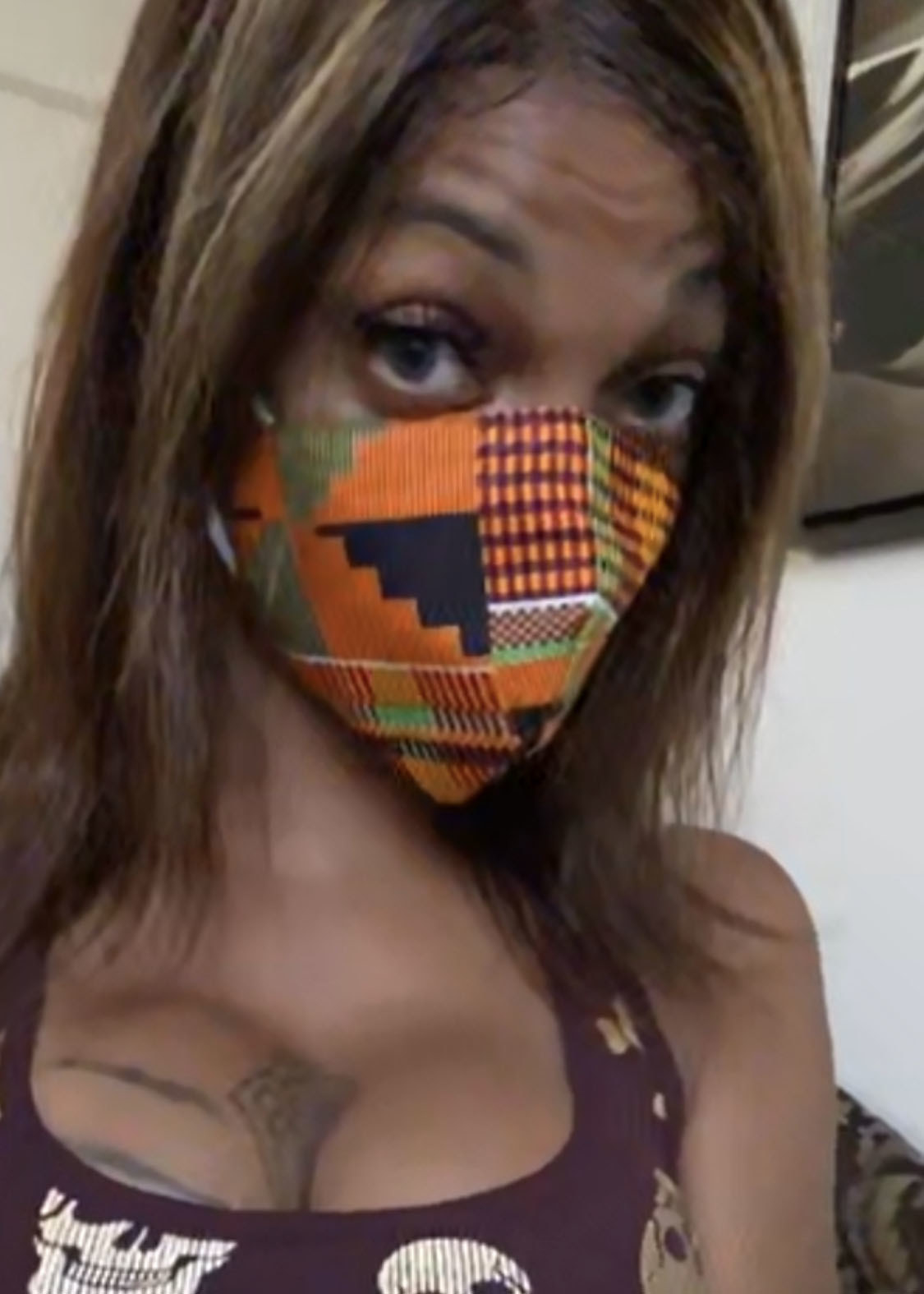
TS Candii, 26, is a sex worker and lead organizer with Decrim NY and the Repeal Walking While Trans Ban coalition, and the founder of Black Trans News.
TS Candii was also a lead organizer for the Justice for Nina Pop and Tony McDade protest at Stonewall Inn on June 2.
Why did you become an activist?
Growing up realizing that at heart I’m a woman and having to make my inner match my outer was a challenge, and be accepted with all of the above was a challenge. The acceptance of who I am as a woman was a challenge, the acceptance from the world. And so I started becoming an activist, the reason I started speaking up and speaking out was because a lot of the community was scared because we didn’t have a voice. So I had to come off the menu and get at the table. So I made my own seat.
A lot of us do not live to see 35. I became a voice for them because we were getting washed away. They silence us. We’re just now starting to be heard.
What are you fighting for right now?
What I’m fighting for right now is our humanity. I’m fighting for our pursuit of happiness, to just be. And to unknot our existence out of the criminal justice system and to reclaim our narrative and to reformulate — I’m trying to find a formula to rewrite the economic systems so it’s free for us all, so that we don’t have to sell sex for survival.
What are the most urgent changes that you’d like to see?
The most urgent changes that need to be made are the economic system first. And the criminal justice system. And the educational system. The economic system needs to be able to fit us all. The economic system is only written for white people. That’s the issue. We live day by day because of the economic system. That system needs to be rewritten. Everything that we do to support us, they criminalize it.
What kind of support do you need?
We need economic support. We need to abolish the jails. We know law enforcement from the beginning of time was always slave catchers.
So right now what we need, we need laws to be made, and for laws to be changed and created by those that have lived the experience. We have individuals that don’t understand because they don’t know, and refuse because they’re uneducated — a lot of people is not educated on certain things, so they automatically judge it and criminalize it and it’s done. Because they don’t know.
So now I gotta sit here and cry and I gotta tell you how the government assistance programs, how they give you pennies. How they give you pennies. And I make more money with my god-given body than they give me yearly. The social programs, you got food stamps, the WIC [a federal food program for women, infants, and children], those pennies. Those are pennies. And then you have to explain — what is WIC? What is that? You know? Some people are like what is EBT [electronic benefit transfer, similar to a debit card for government benefit programs]? What is food stamps? What is Section 8 [a federal rent assistance program]? And they tax the poor and don’t tax the rich. It’s just unfair. It’s unfair.
What do you need from people who are not trans or gender nonconforming?
I need all their money. And they can donate it to Black Trans News LLC. Please and thank you.
I can get everything I need. Just give me the money. That’s all we need. We need the money. If y’all give us the money, we good, trust me.
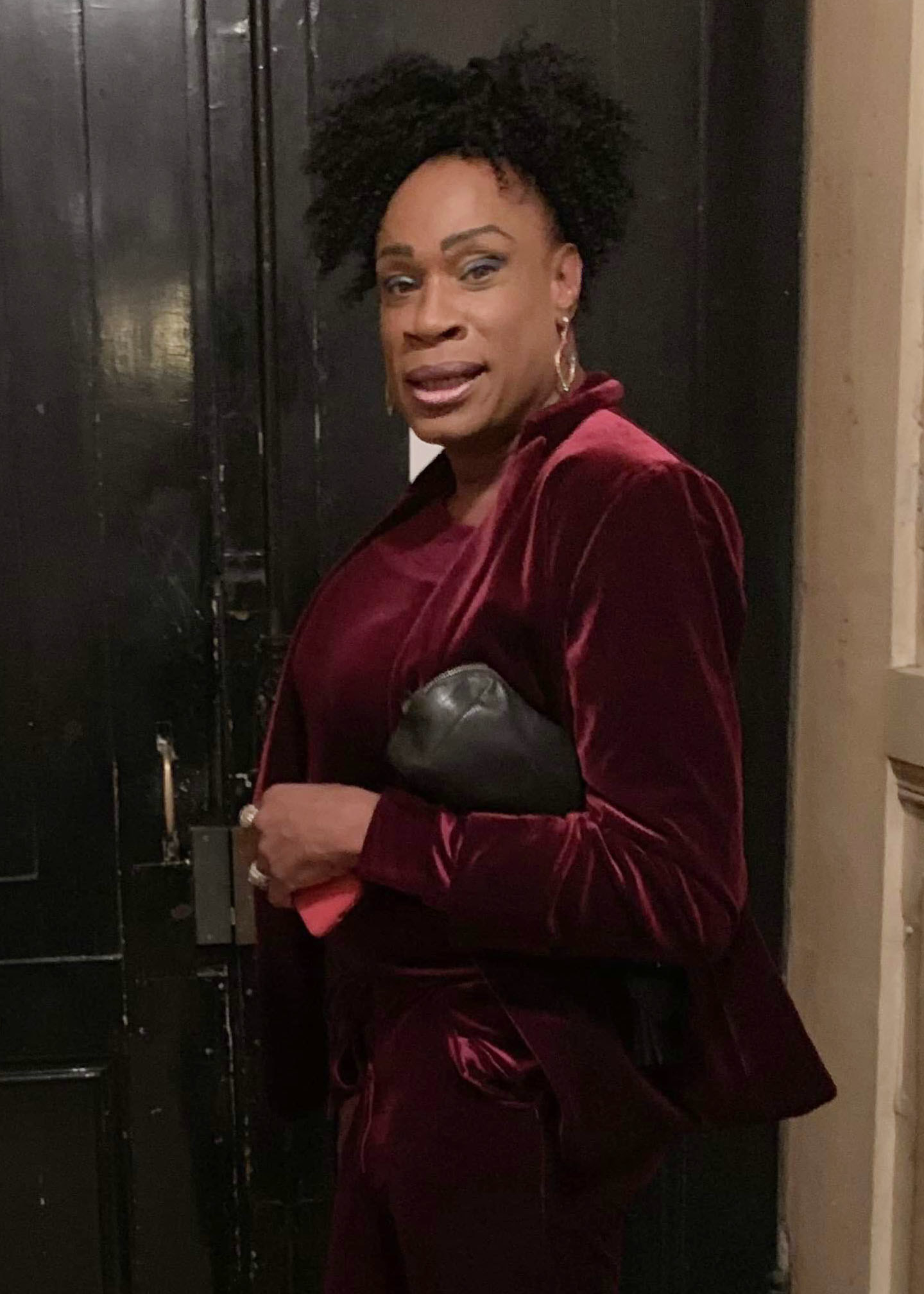
Ceyenne Doroshow, fiftysomething, is a former sex worker and the founder and executive director of GLITS Inc., which provides housing and crisis services, and helps build sustainability for LGBTQ people in New York City.
Doroshow spoke at the Brooklyn Liberation rally on June 14.
What are you fighting for right now?
Sustainability, the policing laws, defunding police, trans lives, Black trans lives, equity within our community. Housing within our community — sustainable housing. Because often we’re displaced by landlords, if placed at all, but very often we’re displaced without support or recourse to the landlords. Trans folks, and the LGBTQIA community. But mainly trans folks.
What that looks like to me is not a project or a multi-dwelling building where there are other elements of harm. It’s dangerous for some trans people to live in some areas. When you think of housing someone, you think of the area, you think of the level of safety. I know I do when it comes to myself, so why wouldn’t I want that for my community?
This world is based on the who’s who, based on not growing, based on elements of disdain, not really on helping people of color or my community get to a place of comfort. We often have to fight, we often have to do sex work to get a degree to pay rent, and it’s a lot. I want to be the middleperson for this. I want to give people a chance to go to school, to be their best selves. To have the support of housing to get them there. Who knows better than me that these things are needed?
What are the biggest obstacles you’re facing right now?
I’m not usually one to let anything stand in my way, that’s why I’ve got lawyers. There are roadblocks everywhere. For people like me, you’re always facing a roadblock — and making it through. Resilient people!
It’s just overcoming, and always breaking a glass ceiling in one way or another. Society, ignorance, those are obstacles. Phobias, those are the obstacles. Police, those are more obstacles.
I honestly think, in my opinion, as a society we’re attacking the wrong vessel. We should be dismantling the police union. This is how they’re often allowed to do some of the things that they’re allowed to be doing. That’s an obstacle. With the police union being able to back them up, we fail. Without a civilian review board looking at the history and the background, we fail. Police need policing by civilians, not by theirselves.
We also need to be in rooms with politicians and senators and governors to change these bills and laws which are the chokeholds of our lives. We need to be a part of the conversation with politicians so they know that we’re human, to know that we matter.
What are the most urgent changes that you’d like to see?
The WWT bill — the “walking while trans” bill, because it wasn’t passed. The equity that we are trying to obtain for a better tomorrow, less trans deaths. Police reform. Defund police needs to happen immediately, and in my personal opinion, take guns away from police in New York. Give them Tasers the way they do in the UK.
What do you need from people who are not trans or gender nonconforming?
To do the footwork. I need them to be accountable. I need them to do the humane thing. It’s very simple. It’s: What would you want for yourself? Or what would you want for your children?
Is there anything that’s bringing you joy or giving you hope right now?
It gave me joy and it’s giving me hope that many people are donating to the work. It’s bringing me a lot of joy to see the collaboration on mass level being in support of my work last night. Somebody just donated $3K, instead of $1K.
It means they’ll be able to go on and sustain and possibly go to school and have everything they need. It’s not about me having anything. It’s about them having everything. It’s about them having the equity to build equity. Community taking care of community.
I think when [GLITS] hit $300,000 in a day, that was inspiring. I think it’s the work that makes them want to donate. It’s seeing the bigger picture. Because of all of the death, because of George Floyd, because of the degradation and the racism and the simple prejudice we’ve had to endure. But then you add in LGBT, it’s like last on the food chain. Finally people are understanding that it’s time to change. [On Sunday, June 14, Doroshow announced that GLITS reached its target of $1 million to buy housing.]
I’ve been doing this for so long with nothing. I would do it all again with nothing if I had to.
UPDATE
The lead image has been updated in this piece.

